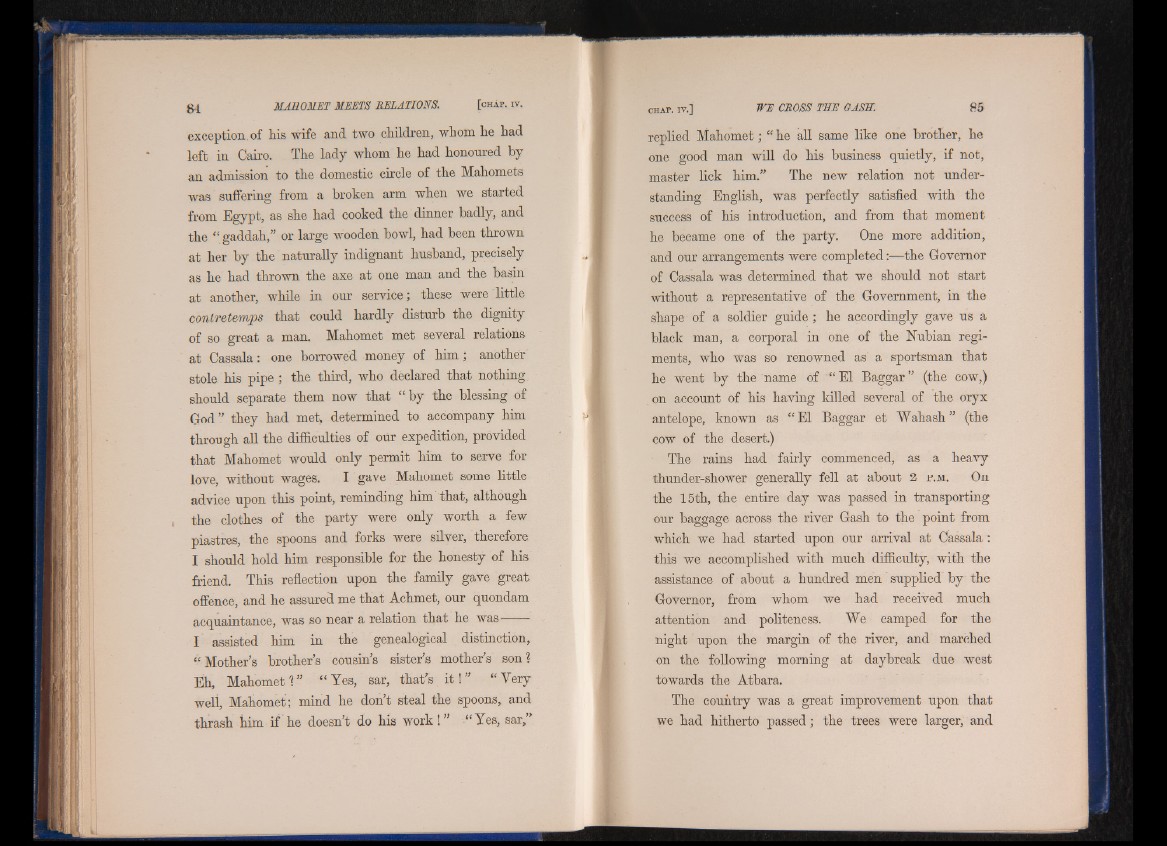
exception, of his wife and two children, whom he had
left in Cairo. The lady whom he had honoured by
an admission to the domestic circle of the Mahomets
was suffering from a broken arm when we started
from Egypt, as she had cooked the dinner badly, and
the “ gaddah,” or large wooden bowl, had been thrown
at her by the naturally indignant husband, precisely
as he had thrown the axe at one man and the basin
at another, while in our service; these were little
contretemps that could hardly disturb the dignity
of so great a rnan. Mahomet met several relations
at Cassala: one borrowed money of him; another
stole his pipe ; the third, who declared that nothing
should separate them now that “ by the blessing of
God” they had met, determined to accompany him
through all the difficulties of our expedition, provided
that Mahomet would only permit him to serve for
love, without wages. I gave Mahomet some little
advice upon this point, reminding him that, although
the clothes of the party were only worth a few
piastres, the spoons and forks were silver, therefore
I should hold him responsible for the honesty of his
friend. This reflection upon the family gave great
offence, and he assured me that Achmet, our quondam
acquaintance, was so near a relation that he was
I assisted him in the genealogical distinction,
“ Mother’s brother’s cousin’s sister’s mother’s son?
Eh, Mahomet?” “ Yes, sar, that’s it! ” “ Very
weli, Mahomet; mind he don’t steal the spoons, and
thrash him if he doesn’t do his work ! ” “ Yes, sar,
replied Mahomet; “ he all same like one brother, he
one good man will do his business quietly, if not,
master lick him.” The new relation not understanding
English, was perfectly satisfied with the
success of his introduction, and from that moment
he became one of the party. One more addition,
and our arrangements were completed:—the Governor
of Cassala was determined that we should not start
without a representative of the Government, in the
shape of a soldier guide ; he accordingly gave us a
black man, a corporal in one of the Nubian regiments,
who was so renowned as a sportsman that
he went by the name of “ El Baggar” (the cow,)
on account of his having killed several of the oryx
antelope, known as “ El Baggar et Wahash” (the
cow of the desert.)
The rains had fairly commenced, as a heavy
thunder-shower generally fell at about 2 p .m. On
the 15th, the entire day was passed in transporting
our baggage across the river Gash to the point from
which we had started upon our arrival at Cassala :
this we accomplished with much difficulty, with the
assistance of about a hundred men supplied by the
Governor, from whom we had received much
attention and politeness. We camped for the
night upon the margin of the river, and marched
on the following morning at daybreak due west
towards the Atbara.
The country was a great improvement upon that
we had hitherto passed; the trees were larger, and